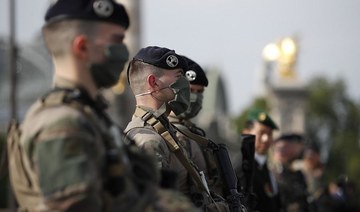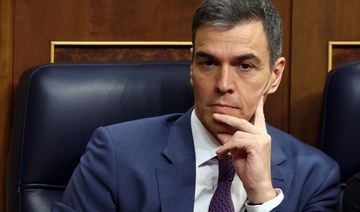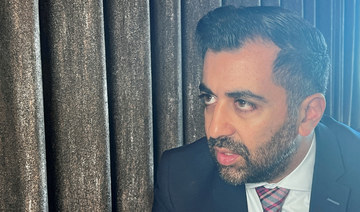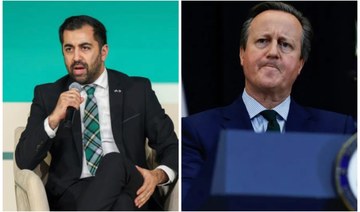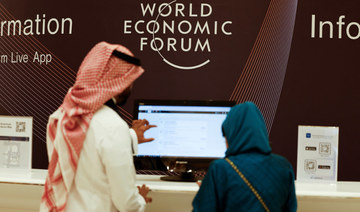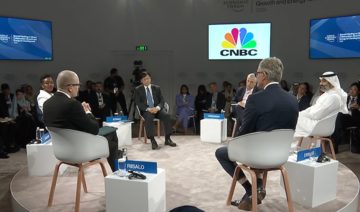BAMAKO, Mali: West African leaders escalated pressure on Mali’s ruling junta late Thursday, calling on them to allow President Ibrahim Boubacar Keita’s return to power as the mutinous soldiers who overthrew him insisted his midnight resignation had been his own decision.
The junta behind Tuesday’s military takeover said the 75-year-old Keita was only being held at army barracks for his own protection, and denied he had been ousted in the first place.
“There was no coup d’état because the constitutional order is still in force,” junta spokesman Ismaël Wagué told The Associated Press in an interview late Thursday. “The president of the republic resigned on his own after making an analysis of the country’s situation.”
Keita was last seen by Malians late Tuesday on state broadcaster ORTM where he announced his immediate resignation and the dissolution of his government and the National Assembly. His speech came just hours after mutinous soldiers had surrounded his house and fired shots into the air before detaining him and the prime minister.
Heads of state from the regional bloc known as ECOWAS late Thursday called for the mobilizing of a standby regional military force, saying Keita must be allowed to serve out the three years left in his term after this week’s “coup attempt.” They warned that the junta was responsible for the safety of Keita and all other detained government officials.
The United Nations and France also urged a return to constitutional order in Mali, amid fears that Islamic extremists could once again gain ground amid the political upheaval, derailing more than seven years of effort to stabilize the country.
French President Emmanuel Macron again condemned Tuesday’s coup “against a president who was democratically elected by his people.”
“We asked for him to be released as quickly as possible, and for no violence to be committed,” Macron said, speaking Thursday evening alongside German Chancellor Angela Merkel.
ECOWAS previously invoked the potential use of its standby military force in 2017 after then-Gambian President Yahya Jammeh refused to acknowledge defeat in an election. Jammeh ultimately agreed to go into exile and no military action was taken.
ECOWAS said it would soon send a delegation to Bamako to try to help restore constitutional order. The bloc already had suspended Mali’s membership, closed its borders with the country and promised other financial sanctions against the junta leaders.
French, UN and West African partners have been trying to stabilize Mali after a similar 2012 coup created a power vacuum that allowed jihadists to seize control of northern towns until a French-led military operation the following year.
“Mali has not only descended into political chaos, but also socioeconomic and security disaster with potential tragic consequences to Mali and the sub-region,” Nigerian President Muhammadu Buhari said.
Analysts saw few signs that political opposition leaders were aware of the coup in advance, though they now stand to benefit through an opportunity to serve in the transitional government promised by the junta.
Observers fear the political upheaval will allow Islamic extremists in Mali to expand their reach once again. Wagué, the junta spokesman, said the new military rulers were doing everything possible to be sure that was not the case.
“It is possible that some may take advantage of the situation to plan things, but we are in contact with the operational units on the ground so that they can continue their work,” he told AP. “We know how difficult it is for them because all of us come from the field and we will do everything we can to increase their operational capacity.”
After Al-Qaeda-linked militants took over the major towns in northern Mali, they implemented their strict interpretation of Islamic law, including amputating hands for those accused of theft. France, which maintains strong economic and political ties to Mali, later led the intervention to force them from power.
But those jihadists have since regrouped and launched relentless attacks on the Malian military, as well as UN peacekeepers and regional forces trying to stabilize the country. The extremists also have moved south, inflaming tensions between ethnic groups in central Mali.
Col. Assimi Goita, the country’s new strongman, had been head of a special military unit based in central Mali. He also had taken part in the annual Flintlock training organized by the US military to help Mali and other Sahel countries better fight extremists.
Marc-André Boisvert, a member of the UN panel of experts for Mali and an independent researcher on the Malian armed forces, said that was nothing unusual.
“Everybody in the armed forces who wants to become an officer and wants to progress needs foreign training,” he said.
This coup appeared well-organized by a group of officers with experience in the field, he said. There was quick communication, little to no bloodshed, and statements of reassurance directed at the international community.
“It was a really smooth and well-oiled machine,” he said.
Keita, the toppled president, had won the 2013 election in a landslide, emerging from a field of more than two dozen candidates to get more than 77% of the vote. He won reelection five years later, but his political fortunes have tumbled in the past year.
While Mali’s Islamic insurgency started before Keita took office, many felt his government did not do enough to end the violence.
Opposition to Keita’s government rose after legislative elections earlier this year that dozens of candidates disputed. In a conciliatory gesture, Keita said he was open to holding the vote again in contested areas. But by June, demonstrators were taking to the streets en masse calling for his ouster.
West African leaders call on Mali junta to free president
https://arab.news/mv43q
West African leaders call on Mali junta to free president
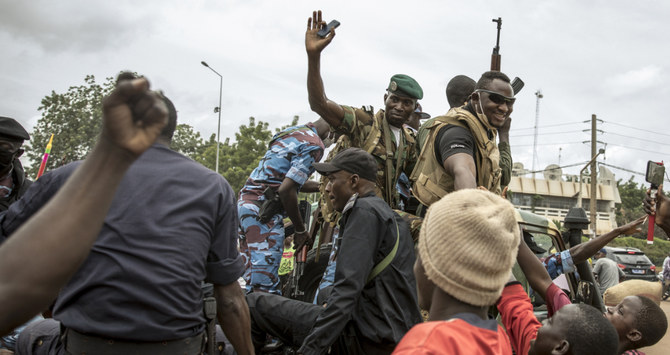
- Keita was last seen by Malians late Tuesday on state broadcaster ORTM where he announced his immediate resignation and the dissolution of his government and the National Assembly
Likely attack by Yemen’s Houthis targets a vessel in the Red Sea
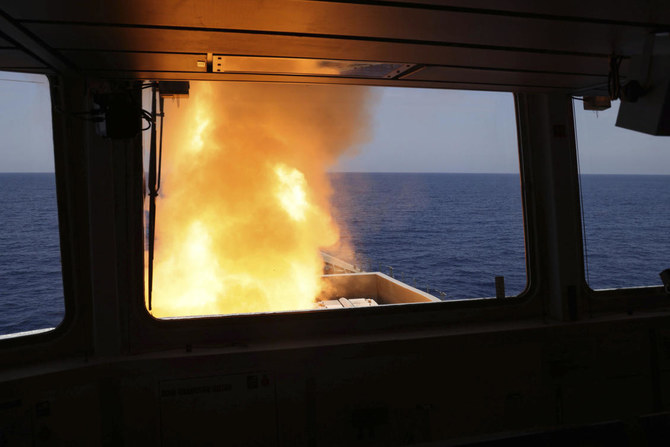
The attack happened off the coast of Mokha, Yemen, the British military’s United Kingdom Maritime Trade Operations center said, without offering any other immediate details.
It urged vessels to exercise caution in the area.
The Houthis did not immediately acknowledge any attack there, though suspicion fell on the group. It typically takes the rebels several hours before claiming their assaults.
The Houthis say their attacks on shipping in the Red Sea and Gulf of Aden are aimed at pressuring Israel to end its war against Hamas in Gaza, which has killed more than 34,000 Palestinians there. The war began after Hamas-led militants attacked Israel on Oct. 7, killing 1,200 people and taking some 250 others hostage.
The Houthis have launched more than 50 attacks on shipping, seized one vessel and sank another since November, according to the US Maritime Administration.
Houthi attacks have dropped in recent weeks as the rebels have been targeted by a US-led airstrike campaign in Yemen. Shipping through the Red Sea and Gulf of Aden has declined because of the threat.
American officials have speculated that the rebels may be running out of weapons as a result of the US-led campaign against them and after firing drones and missiles steadily in the last months. However, the rebels have renewed their attacks in the last week.
The Houthis on Saturday claimed it shot down another of the US military’s MQ-9 Reaper drones, airing footage of parts that corresponded to known pieces of the unmanned aircraft. US Air Force Lt. Col. Bryon J. McGarry, a Defense Department spokesperson, acknowledged to The Associated Press on Saturday that “a US Air Force MQ-9 drone crashed in Yemen.” He said an investigation was underway, without elaborating.
Pedro Sanchez stays on as Spain’s prime minister after weighing exit
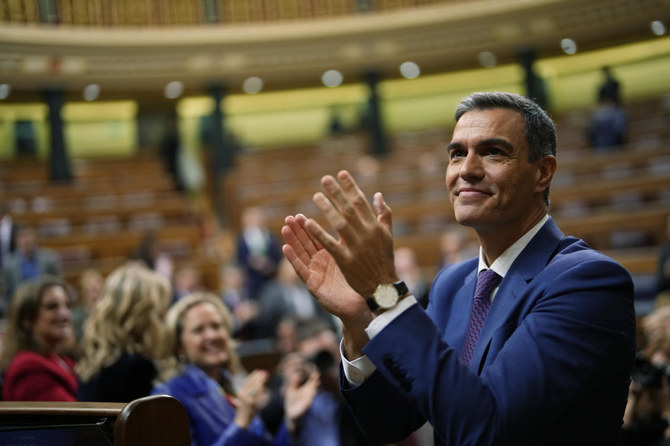
- Sanchez had surprised foes and allies when earlier said he considers quitting
- He described the court investigation of his wife Begona Gomez for influence peddling and business corruption as orchestrated by his opponents
MADRID: Spain’s Prime Minister Pedro Sanchez said on Monday he had decided to continue in office, days after abruptly announcing he was considering his future following the launch of a corruption investigation against his wife.
The center-left prime minister, 52, had surprised foes and allies alike when he said on Wednesday he was taking time from public duty to consider quitting. He described the court investigation of his wife Begona Gomez for influence peddling and business corruption as orchestrated by his opponents.
Sanchez met King Felipe VI on Monday — a step that would have been necessary should he have decided to resign — but announced in a televised address that he had informed the monarch of his decision to stay on. He had been encouraged to stay by widespread expressions of support over the weekend, Sanchez said.
“I have decided to go on, if possible even stronger as prime minister. This is not business as usual, things are going to be different,” he said in a national broadcast.
His announcement that he might quit had caused further turmoil in Spanish politics, where a fractious parliament has struggled to form coalition governments after close elections. Should a new election have been required, it would have been the fourth in five years.
The opposition will try to exploit the sign of indecision from Sanchez, but the impact may be limited because Spain’s political landscape is already so polarized, said Ignacio Jurado, political science professor at Madrid’s Carlos III University.
“His credibility is already hotly contested and voters have already given it to him or taken it away,” he said. “As a leader he has shown a weakness and it’s something that the opposition will exploit a lot.”
Scotland’s Yousaf will resign as first minister, BBC says
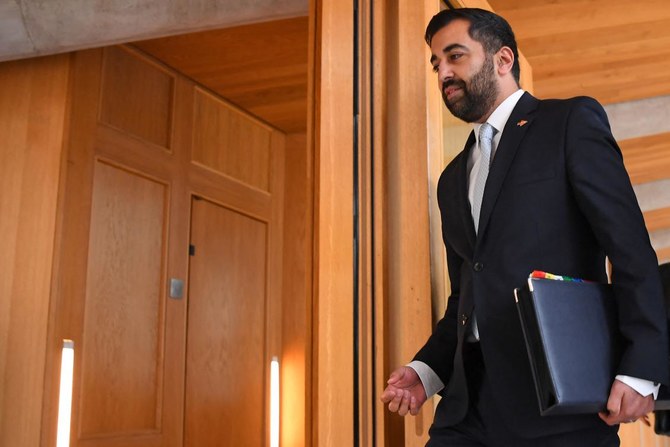
LONDON: Scotland’s first minister Humza Yousaf will resign as early as Monday, the BBC reported, after the possibility of him winning a vote of confidence this week appeared to dwindle over the weekend.
“Scotland’s First Minister Humza Yousaf (is) to resign as early as today, the BBC understands,” BBC News said, without citing a source.
Last week, Yousaf abruptly ended a power-sharing agreement between his Scottish National Party (SNP) and the Green Party, in the hopes that he could lead a minority government — but opposition parties have tabled a vote of no confidence.
The pro-independence SNP’s fortunes have faltered amid a funding scandal and the resignation of a party leader last year, while there has been infighting over how progressive its pitch should be as it seeks to woo back voters.
Just days ago, Yousaf said he was “quite confident” that he could win the no confidence vote called by political opponents, but by Monday, his offer of talks with other parties to try to shore up his minority government seemed to be faltering.
The leadership crisis and a second no-confidence vote against the Scottish government deepens problems faced by Yousaf’s Scottish National Party, which is losing popular support after 17 years of heading the Scottish Government.
Earlier this month, polling firm YouGov said the Labour Party had overtaken the SNP in voting intentions for a Westminster election, for the first time in a decade.
The leader of the Scottish Greens, Patrick Harvie, told BBC radio there was nothing Yousaf could say to persuade his party to support the first minister in the parliamentary confidence vote, leaving Yousaf with few options.
The vote is due to take place later this week.
A victory for Labour in Scotland in Britain’s next national election — expected later this year — would significantly bolster the party’s chances of taking power from Prime Minister Rishi Sunak’s Conservative Party.
If Yousaf loses, parliament would have 28 days to choose a new first minister before an election is forced.
Former SNP leader John Swinney has been approached by senior party figures to become an interim first minister in the event of Yousaf being forced from office, the Times newspaper said, adding that Swinney was reluctant to step up because of personal circumstances.
Yousaf, who previously held health and justice ministerial briefs in the Scottish Government, succeeded former SNP leader Nicola Sturgeon as first minister in March 2023.
She resigned last year and has since been embroiled in a party funding scandal with her husband, who was charged this month with embezzling funds. Both deny wrongdoing.
Global teacher shortage needs more than AI: WEF panelists
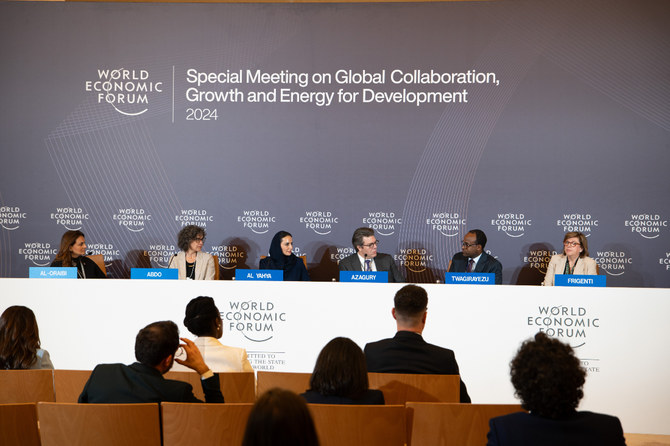
- Tailored solutions required for less-developed nations, says expert
- AI must complement education and training, changing of curricula
RIYADH: The global shortage of teachers will not be remedied solely through the use of artificial intelligence, according to education experts and decision-makers at the World Economic Forum’s Special Meeting in Riyadh.
“Teachers is the biggest problem at the moment for the education sector in low- and middle-income countries,” Laura Frigenti, chief of the Global Partnership for Education platform, told the panel on Sunday.
Gaspard Twagirayezu, Rwanda’s education minister, said that AI can revolutionize education and provide solutions for the global shortage of teachers.
“Of course, AI and technology are not going to replace teachers,” he added. “We can make sure that teachers are properly educated.”
“Here, we are trying to talk about how AI can help in producing education materials for the teachers so that we do not have all these expensive training sessions that we all have to go through.”
Stressing that AI can support teachers in the classroom, Twagirayezu explained that “teachers can be enabled to learn on their own using AI.”
Frigenti said that when it comes to harnessing the power of artificial intelligence in education, “there is not a kind of a one-size-fits-all technology that you can just import into one particular country.”
“You have to start from the conditions of that country and think in terms of a solution,” she continued. If there are no tailored solutions, this would “create a much bigger gap between a part of the world that can invest $8,000 per child per year in education and a part of the world that barely manages to invest $80.”
She added: “And that is going to create all sorts of socio-economic disparities, inequalities within society, (and) inequalities between the Global North and Global South.”
Frigenti added: “We integrate the improvements that technology and AI can add to the way in which the sector performs or is managed to a bigger way of thinking about the sector’s needs to transform, which includes a lot — changing the curricula (and) thinking about what you have to do for the (teachers) problem.”
The panel discussion, titled “Is Education Ready for AI,” featured speakers including Rudayna Abdo, founder and CEO of Thaki; Jack Azagury, group CEO of Accenture; and Deemah Al-Yahya, secretary-general of the Digital Cooperation Organization.
China’s robotic spacecraft headed for moon to carry payload from Pakistan
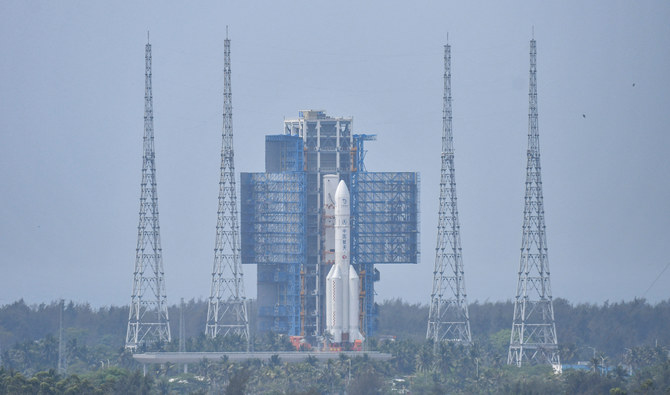
- China will send a robotic spacecraft in coming days on round trip to moon’s far side in first of three missions
- Chang’e-6 spacecraft will carry payloads from countries such as France, Italy, Sweden and Pakistan
BEIJING: China will send a robotic spacecraft in coming days on a round trip to the moon’s far side in the first of three technically demanding missions that will pave the way for an inaugural Chinese crewed landing and a base on the lunar south pole.
Since the first Chang’e mission in 2007, named after the mythical Chinese moon goddess, China has made leaps forward in its lunar exploration, narrowing the technological chasm with the United States and Russia.
In 2020, China brought back samples from the moon’s near side in the first sample retrieval in more than four decades, confirming for the first time it could safely return an uncrewed spacecraft to Earth from the lunar surface.
This week, China is expected to launch Chang’e-6 using the backup spacecraft from the 2020 mission, and collect soil and rocks from the side of the moon that permanently faces away from Earth.
With no direct line of sight with the Earth, Chang’e-6 must rely on a recently deployed relay satellite orbiting the moon during its 53-day mission, including a never-before attempted ascent from the moon’s “hidden” side on its return journey home.
The same relay satellite will support the uncrewed Chang’e-7 and 8 missions in 2026 and 2028, respectively, when China starts to explore the south pole for water and build a rudimentary outpost with Russia. China aims to put its astronauts on the moon by 2030.
Beijing’s polar plans have worried NASA, whose administrator, Bill Nelson, has repeatedly warned that China would claim any water resources as its own. Beijing says it remains committed to cooperation with all nations on building a “shared” future.
On Chang’e-6, China will carry payloads from France, Italy, Sweden and Pakistan, and on Chang’e-7, payloads from Russia, Switzerland and Thailand.
NASA is banned by US law from any collaboration, direct or indirect, with China.
Under the separate NASA-led Artemis program, US astronauts will land near the south pole in 2026, the first humans on the moon since 1972.
“International cooperation is key (to lunar exploration),” Clive Neal, professor of planetary geology at the University of Notre Dame, told Reuters. “It’s just that China and the US aren’t cooperating right now. I hope that will happen.”
SOUTH POLE AMBITIONS
Chang’e 6 will attempt to land on the northeastern side of the vast South Pole-Aitkin Basin, the oldest known impact crater in the solar system.
The southernmost landing ever was carried out in February by IM-1, a joint mission between NASA and the Texas-based private firm Intuitive Machines.
After touchdown at Malapert A, a site near the south pole that was believed to be relatively flat, the spacecraft tilted sharply to one side amid a host of technical problems, reflecting the high-risk nature of lunar landings.
The south pole has been described by scientists as the “golden belt” for lunar exploration.
Polar ice could sustain long-term research bases without relying on expensive resources transported from Earth. India’s Chandrayaan-1 launched in 2008 confirmed the existence of ice inside polar craters.
Chang’e-6’s sample return could also shed more light on the early evolution of the moon and the inner solar system.
The lack of volcanic activity on the moon’s far side means there are more craters not covered by ancient lava flows, preserving materials from the moon’s early formation.
So far, all lunar samples taken by the United States and the former Soviet Union in the 1970s and China in 2020 were from the moon’s near side, where volcanism had been far more active.
Chang’e-6, after a successful landing, will collect about 2 kilograms (4.4 pounds) of samples with a mechanical scoop and a drill.
“If successful, China’s Chang’e-6 mission would be a milestone-making event,” Leonard David, author of “Moon Rush: The New Space Race,” told Reuters. “The robotic reach to the Moon’s far side, and bringing specimens back to Earth, helps fill in the blanks about the still-murky origin of our Moon.”



